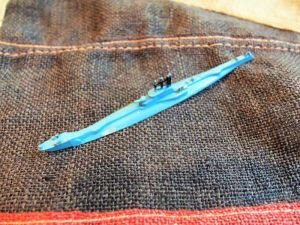Submarine A Class M 817 Triang Minic Ships 1959-64
Price: NZ$16.85
Code: BH310
Submarine A Class M 817 Triang Minic Ships 1959-64
Royal Navy’s forty six boat “A” Class of submarines ordered during the Second World War. Thirty boats were cancelled at the end of the war with the remaining sixteen boats being laid down between 1943 and 1945 and commissioned between 1945 and 1948.
The “A” Class submarines were diesel / electric powered boats designed primarily for service in the Pacific Theatre. They were of all welded construction and were fitted with “Snort” breathing equipment which allowed them to run submerged on their diesel engines at snorkelling depth.
Originally designed with a 4” deck gun and ten 21” torpedo tubes, 6 bow and 4 stern, of which 2 bow tubes and 2 stern tubes were external. The external bow and stern torpedo tubes were removed from most boats during their various conversions resulting in four internal bow tubes and two internal stern tubes. Similarly the 4” deck gun was also removed from most of the boats during refits.
The sixteen boats commissioned were HMS Acheron, HMS Aenas, HMS Affray, HMS Alaric, HMS Alcide, HMS Alderney, HMS Alliance, HMS Ambush, HMS Amphon, HMS Anchorite, HMS Andrew, HMS Artemis, HMS Artful, HMS Astute, HMS Auriga and HMS Aurochs.
HMS Affray foundered in the English Channel on 17th April 1951 with the loss of her entire crew as well as a small party of Royal Marine Commandos and twenty three submarine officers who were under training, a total of 75 lives. She was the last British submarine to be lost at sea.
In worn original finish, some chipping and in a good play worn condition for its age. Unboxed model.
We have a very large collection of minic pieces to list if you are looking for anything in particular please email through the contact page on this site.
This section of the shop is about the amazing original series of diecast metal ships and harbour playset accessories, produced under the Tri-ang Minic Ships name in England between 1959 and 1964. As well as the later series of models produced under the Hornby Minic name during the early 1970’s.
The “TRI-ANG” trade mark itself resulted from a play on the truism “three lines make a triangle” the “three lines” in question being the brothers William, Walter and Arthur Lines who founded Lines Bros Limited just after the First World War.
The Tri-ang Minic Ships name comes from the original manufacturer Minic Limited a subsidiary of Lines Bros Limited, owners of the famous “TRI-ANG” trade mark.
The models were produced by Lines Bros Ltd’s Tri-ang Works at Mordon Road, Merton, London SW19 with production moving to Minic Limited at Market Way, Canterbury, Kent during mid 1960.
The original range of ships and harbour accessories are waterline models manufactured to a scale of 1:1200 scale, where one inch is equivalent to 100 feet, the same scale that was used in the manufacture of ship recognition models for training Allied naval and airforce personnel during both the First and Second World Wars.
When Lines Bros Ltd was broken up in the late 1960’s the “TRI-ANG” trade mark remained with Tri-ang Pedigree, another Line Bros subsidiary which was also active in New Zealand and Australia, while the “MINIC” trade mark was transferred to Hornby together with the tooling for the Minic Ships models.
All of the models produced under the Hornby Minic name were produced in Hong Kong after Hornby moved their manufacturing in the early 1970’s. Hornby produced only a limited selection of the original models but also introduced four new models of famous battleships – USS Missouri, IJN Yamato, DKM Bismarck and DKM Scharnhorst.All of the ship models produced under the Hornby Minic name were fitted with a red plastic base equipped with plastic rollers.
The original Tri-ang Minic and Hornby Minic series of models are no longer in production and to the best of our knowledge the tooling for these models no longer exists. So the original models have become quite collectable as they were only made for 6 years and being mainly children’s toys, many sadly have not survived. What has is in various states of repair! Still they are an incredible early 1960’s toy which can be arranged in attractive displays, and enjoyed in many homes or businesses where a nautical theme is desired.



